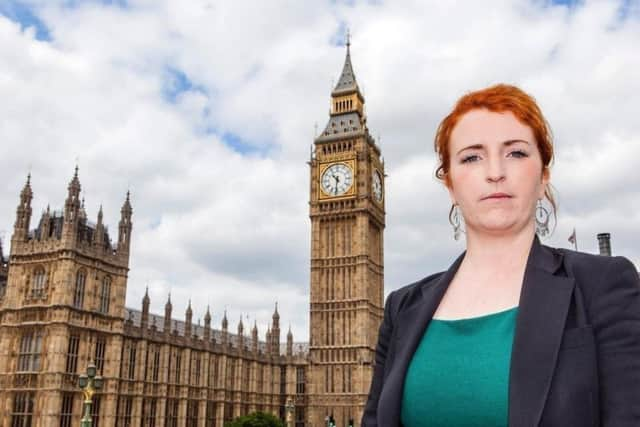'It only happens to women' - MP Louise Haigh opens up about excruciating burst cyst
and live on Freeview channel 276
Louise Haigh, Sheffield Heeley MP and Labour’s Shadow Policing Minister, spoke during a Westminster Hall debate on endometriosis brought by fellow Yorkshire MP Alec Shelbrooke, who represents Elmet and Rothwell for the Tories.
He revealed more than 100 women are thought to have taken their own lives as a result of endometriosis this year alone.
Advertisement
Hide AdAdvertisement
Hide AdMs Haigh made a passionate plea for women’s health issues to be taken more seriously as she said she was brushed off and her problem ignored as recently as last week, when she was left crying on the way home from the hospital.


Ms Haigh said: “Last year around a crucial Brexit vote I collapsed in the opposition whips’ office and was taken to A&E over the road. I ended up staying in St Thomas's [Hospital] for almost a week hooked up to an IV and pumped full of antibiotics and painkillers, before I was eventually diagnosed with a cyst on one of my ovaries having ruptured and caused an infection.
“Last week during a similar round of crucial Brexit votes - it's been very much like Groundhog Day - I was back in A&E, again with the same problem and excruciating pain.”
Ms Haigh said she had not told many people about the issues, but was moved to speak out today because she “realise that my experience of women's health is unfortunately far too common”.
Advertisement
Hide AdAdvertisement
Hide AdShe said: “Last week, I was sent away with painkillers and told that cysts rupture in women all the time. And it very much seems that that has been allowed to happen and is allowed to go without a treatment and without any knowledge of the cause. Because it only happens to women.”
The MP referenced the book Period by Emma Barnett, in which it says part of the reason for the failure in women's health is because it is not talked about.
“We don't talk about our periods because they're seen as shameful, unhygienic, unclean, that they should be kept secret and private - tropes that have been used to subjugate and silence women for centuries," she said.
“Barnett is absolutely right. Societal norms that don't allow discussions on periods and their wider consequences for women's health mean that women will not seek treatment for their pain, as I didn't do for too long. Or when they do, they are shrugged off as I was last week.
Advertisement
Hide AdAdvertisement
Hide Ad“On leaving hospital last week, I cried all the way home in part because of the pain but mostly because I was furious that I had been so instantly dismissed and that I've been told that I would simply have to live with a syndrome, which would cause so much pain and risk on a monthly basis.
“I knew that countless other women would have been dismissed just as I was and gone home feeling exactly the same.
“Because it's really hard to advocate for yourself when you're in pain and feeling ill.
“I realised that we have to start normalising discussion around something as totally normal as periods.
Advertisement
Hide AdAdvertisement
Hide Ad“The lack of education, awareness and medical research we currently have dismisses women and our health problems. It tells us that our pain is less important and that our fertility is irrelevant.”
As part of the discussion Mr Shelbrooke read many accounts from women who had contacted him who suffered with endometriosis and their experiences in the workplace.
He said more than 100 women had taken their own lives.
In one case he shared a woman had a seven year wait for diagnosis, and a further year and a half wait for surgery, which saved her life.
Another had been through four surgeries which were not successful.
Advertisement
Hide AdAdvertisement
Hide AdAnother woman told him: “This disease has had a huge impact on my mental health, alongside other personal family issues. The daily pain I've been going through has made tackling day to day life harder. Whilst I have friends and family support me, I've also lost friends because they don't understand this disease.
“I have tried to take my life multiple times because of it. The problems have also extended to my fertility. I've had miscarriages and a medically advised abortion.”
Mr Shelbrooke said: “I think the problem is in the stories I've given you, all these stories have the same underlying theme: ‘I was told by doctors that it was all a part of being a woman’.”
Paula Sherriff, Labour MP for Dewsbury, went through a chemical menopause in her 30s and said when she first started experiencing heavy and painful periods, she was also dismissed.
Advertisement
Hide AdAdvertisement
Hide AdShe said: “The gynaecologist, it was a mature gentleman, and basically he was very rude. And he said to me, put up with it. You're a woman, women have periods, and that absolutely [...] devastated me.”
When seeking a second opinion, she got a diagnosis but she added: “I just want to stress how important it is that women seek that help at an early age if they're experiencing abnormalities.”